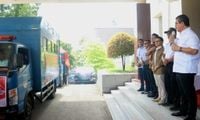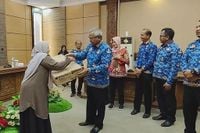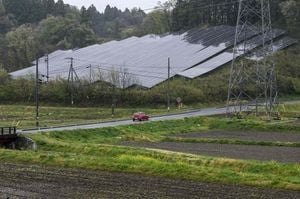The Government of Nusa Tenggara Timur (Pemprov NTT) has taken significant steps to enhance education in the Lembata Regency by providing assistance worth Rp 1 billion. This funding, sourced from the Special Allocation Fund/General Allocation Fund (DAK/DAU) Specific Grant for the 2025 fiscal year, aims to bolster secondary education in the region. The announcement came during a formal meeting held on April 16, 2025, where Governor Melki Laka Lena met with supervisors and headmasters of SMA/SMK/SLB across Lembata.
In attendance were notable officials including the Regent of Lembata, Petrus Kanisius Tuaq; Deputy Regent Muhammad Nasir; and various department heads, including Ambros Kodo, the Head of the NTT Education and Culture Service. The governor emphasized the importance of addressing educational challenges in the area, particularly the shortage of qualified teachers.
Governor Melki highlighted the pressing issue of inadequate teaching staff, stating, "Ketersediaan guru harus kita bereskan sehingga tidak boleh ada lagi anak yang tidak bisa sekolah,” which translates to "The availability of teachers must be resolved so that no child should be unable to attend school.” He proposed a collaborative approach to mitigate this problem, suggesting that schools facing teacher shortages could borrow educators from neighboring institutions, mirroring practices seen in organizations like the police and military during times of need.
In his address, Regent Tuaq outlined several obstacles hindering educational progress in Lembata. He recalled his previous efforts to collaborate with vocational schools to provide assistance in agriculture and livestock, emphasizing the need for such initiatives to support local food security. Tuaq also mentioned plans to prepare local youth for overseas employment by equipping them with the necessary skills.
In a parallel initiative, the Provincial Government of West Kalimantan has also been active in providing support to its communities. Recently, 30 Beneficiary Families (KPM) in Sanggau Regency received crucial work equipment to aid their livelihoods. These families hail from six sub-districts: Kapuas, Kembayan, Meliau, Tayan Hilir, Beduai, and Entikong.
The Acting Head of the West Kalimantan Provincial Social Service, Tatik Gestyaningsih, reported that this assistance is part of the provincial government’s ongoing commitment to helping those in need. The equipment distributed includes tools for baking, ice selling, school canteens, refrigerators, and agricultural implements, among others.
Tatik explained that the assistance was based on proposals submitted by the KPM to the provincial social services, emphasizing that applicants must be registered in the Integrated Social Welfare Data (DTKS) or P3KI systems in Sanggau. Before processing these proposals, the administration's completeness is verified, and field checks are conducted to ensure the accuracy of the recipient data.
Upon receiving the equipment, beneficiaries are required to sign documents acknowledging receipt and committing to use the items for their intended purposes. Tatik cautioned against neglecting the equipment, stating, "Don’t let it just sit at home, let alone sell it, because there will be inspections by the inspectorate.”
Meanwhile, Aswin Khatib, the Acting Secretary of Sanggau Regency, stressed the importance of consistency in business endeavors. He shared a success story of an entrepreneur from Yogyakarta who began with a simple food delivery service and, through perseverance, grew into a prominent business figure. Khatib encouraged the KPM to leverage the provided tools effectively to foster their entrepreneurial aspirations.
These initiatives from both NTT and West Kalimantan highlight a broader commitment to improving education and economic opportunities in Indonesia. By addressing the needs of students and local families, both provincial governments aim to create a more sustainable future for their communities.
As these programs unfold, the collaboration between local governments and educational institutions will be crucial in overcoming the challenges faced in the region. The commitment to enhancing educational resources and providing practical support to families reflects a growing awareness of the importance of education and economic empowerment in fostering community resilience.





